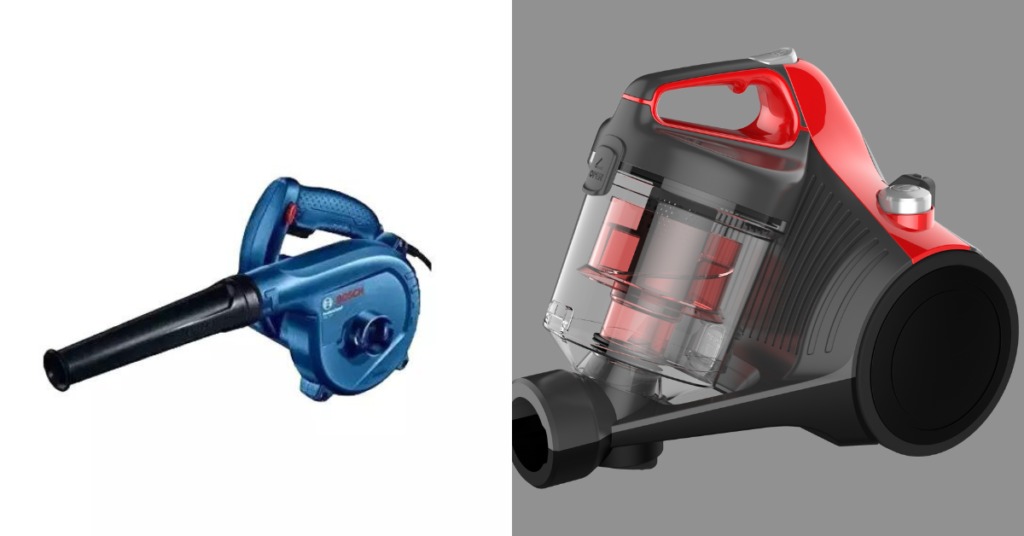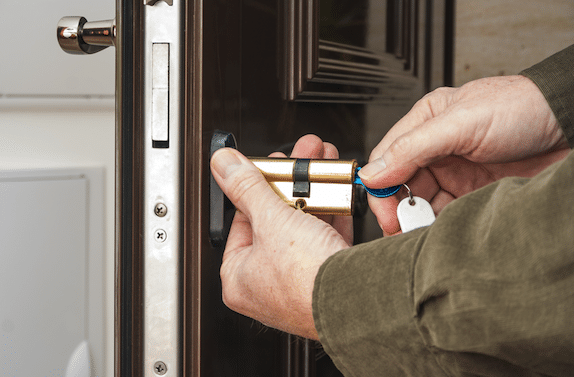Want to know the Difference between Air Blower and Vacuum Cleaner? Then, you are at the right page.
The foundation of leading a healthy life is cleanliness and hygiene. Maintaining a clean environment prevents you from coming into contact with microorganisms, which reduces your risk of contracting diseases.
Cleaning was traditionally done with water, occasionally diluted with detergent. But later, air-cleaning techniques were created.
So, let’s take a look at the difference between Air Blower and Vacuum Cleaner.
Related Post: Airbrush cleaner vs thinner (What is Better?)
Air Blower: Overview

Source: businessinsider.in
Air Blowers are equipment that increase the speed and volume of air while drawing it in at an inlet and pushing it out an exit. They are mostly utilized for the flow of air or gas needed for conveying, chilling, ventilation, aspirating, etc.
To remove dust from every crevice, air blower machines are straightforward and effective electrical equipment used in households and workplaces.
You need Air Blowers to remove dust from gadgets and electronics that have delicate elements that cannot be cleaned with a cloth because they have constant air pressure.
The time and effort required for operations like Air Cleaning, and dusting are significantly reduced by this sturdy and effective machine.
Keep exploring our recent blog for information on Drivetrain Cleaner vs Degreaser : Which One to Choose?
Vacuum Cleaner: Overview

Source: images.kkeu.de
Vacuum Cleaners are electrically powered tools that remove and polish a variety of surfaces by gathering but also getting rid of dust and other small particles.
In a dust pouch, the cleaned-up dust and pollutants are poured into the cleaning solution. In addition to being efficient in removing allergens and dust, vacuum cleaners are also simple to use, saving both time and energy.
They have filters and suction motors to draw in dust and grime. Vacuum Cleaners can be divided into portable, canister, vertical and robotic types.
We’ve also covered related article on:
- Can you use a Wet-Dry Vac without a Filter?
- Why is my Vacuum Cleaner Smoking
- What is the Difference between Vacuum Cleaner and Floor Buffer
- Can you use a Wet Dry Vac without a Bag
- How to Make Bagless Vacuum Smell Better?
Exploring the Differences between Air Blower and Vacuum Cleaner

| Feature | Air Blower | Vacuum Cleaner |
| Working Theory | Blows air to operate. | Functions by Sucking Air. |
| Holdings for Dust | Air Blowers cannot store dust. | Hoover can store the dust after cleaning. |
| Noise Generation | Blowers may produce intrusive noises. | Vacuum Cleaners don’t produce loud noises. |
| .Size | This device is smaller in size in comparison to vacuum cleaners. | This appliance is larger in size and can be used for multiple cleaning purposes. |
| Introduced | Introduced in 1977. | Introduced in 1901. |
Also Read- Wet and Dry Vacuum Cleaner vs Dry Vacuum Cleaner: Which is Better?
Which One to Buy Between Air Blower & Vacuum Cleaner?

Source: thespruce.com
It depends on the specific needs and preferences that which one to buy between the two devices, but still, you can make a decision by reading these other main differences between the two:-
- Instead of throwing air, like a blower does, a vacuum draws in.
- Blowers run on an electric or gas motor, whereas vacuum cleaners use an electric motor to run the fan that provides suction.
- Vacuum Cleaners have the space to store the filtered dust that comes with air, whereas blowers are designed to blow the dirt, not store it.
- Vacuum Cleaners don’t make loud noises when they’re operating . Whereas, Blowers create a very loud noise specially the gas-powered blowers.
Don’t miss our other articles on vacuum cleaners, which you can find in our blog archives:
- Use of Vacuum Cleaner in Housekeeping
- How did the Vacuum Cleaner impact Society?
- What Type of Energy Does a Vacuum Cleaner Use? Discover the Power Source
Conclusion
Air Blowers and Vacuum Cleaners are a great choice for house cleaning needs. You have to choose the right appliance between the two because both have distinctions.
We have covered the differentiation above in this article, which we hope will help you in making a wise decision.


